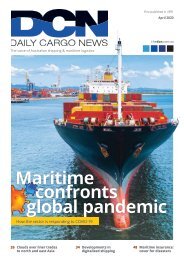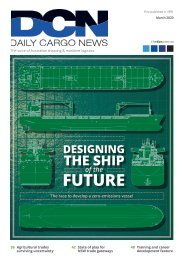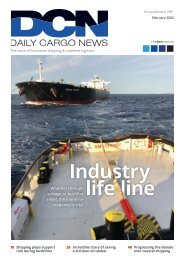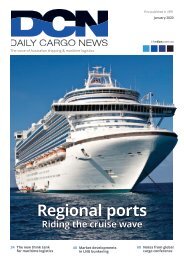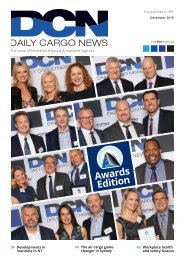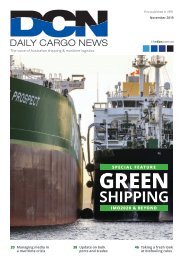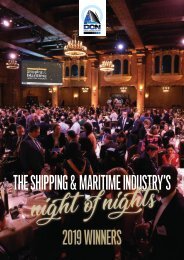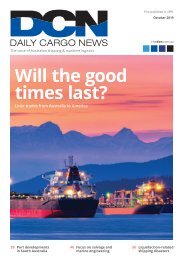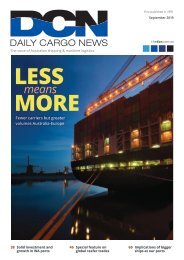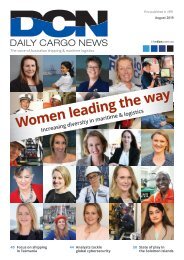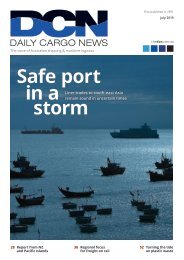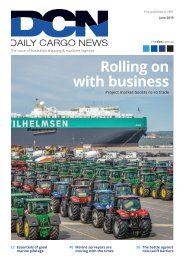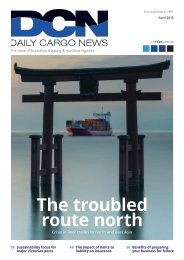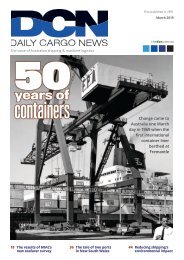DCN May Edition 2019
Create successful ePaper yourself
Turn your PDF publications into a flip-book with our unique Google optimized e-Paper software.
TRADE LAW<br />
What happens next for our<br />
trade agenda after the election?<br />
Andrew Hudson examines the potential fate of pending FTAs and other trade-related<br />
issues that may, or may not, be affected by the upcoming federal election<br />
I WRITE THIS ARTICLE ON 12 APRIL,<br />
yet to secure the same benefits. Indeed, the<br />
shortly after the announcement of the<br />
engagement of SMEs seems to have flat-<br />
federal budget and the announcement of<br />
lined with little use of FTAs.<br />
the federal election date. As expected, this<br />
Both of the major parties share the<br />
period has included the usual claim and<br />
same interest in supporting SMEs getting<br />
counter-claim between the major political<br />
into exports and securing benefits from<br />
parties and a certain amount of cynicism<br />
the trade agenda and both have worked<br />
that even after the election, the political<br />
together to advance that agenda - and have<br />
landscape may not change significantly.<br />
advanced ideas to assist in that process.<br />
Given recent political history there is<br />
For example in the recent federal budget,<br />
also a level of interest (and concern) as to<br />
the federal government announced a<br />
what our preferential voting system will<br />
significant increase in funding for the<br />
deliver for the smaller political parties or<br />
Export Market Development Grant scheme<br />
independents. This is especially the case<br />
as well as more funding for the Trade Start<br />
with our Senate where the inability of a major<br />
program and continued funding for work<br />
party to secure a majority means the game of<br />
against non-tariff barriers. The recent<br />
persuasion and compromise will continue.<br />
parliamentary inquiries have endorsed<br />
That usually delivers unlikely alliances.<br />
the ongoing work of Austrade and other<br />
agencies to assist industry to understand<br />
Andrew Hudson, partner, Rigby Cooke Lawyers<br />
TRADE IS GOOD<br />
and use FTAs as well as enlisting the<br />
Unlike many countries (Brexit anyone?),<br />
assistance of groups such as licensed<br />
and the Department of Industry to work<br />
both major political parties share many<br />
customs brokers and freight forwarders to<br />
collaboratively to address NTBs.<br />
of the same views regarding trade. There<br />
similarly improve understanding and use<br />
certainly seems to be bipartisan support to<br />
of FTAs.<br />
CURRENT AND FUTURE FTAS<br />
advance the trade agenda to ensure growth<br />
The main point of difference now seems to<br />
in exports and GDP and deliver benefits to<br />
LABOR ANNOUNCEMENTS<br />
reside with what should actually be in FTAs.<br />
a wider class of members of society. These<br />
In a recent speech Labor trade spokesman<br />
For some time there has been resistance to<br />
views include support for the World Trade<br />
Jason Clare made several announcements<br />
certain aspects of FTAs, including investor<br />
Organisation and its dispute settlement<br />
of initiatives aimed at improving SME<br />
- state dispute settlement provisions which<br />
arrangements as the best means to address<br />
engagement including creating a category<br />
potentially enable the private sector to<br />
global trade tensions, albeit with some<br />
of “cleared advisors” from business,<br />
pursue disputes directly with sovereign<br />
changes to those arrangements to address a<br />
trade unions and other bodies (hopefully<br />
governments. Other concerns include<br />
number of legitimate concerns raised about<br />
industry associations). In a process<br />
the suspension of labour market testing<br />
the existing regime.<br />
similar to that existing in the US, those<br />
for skilled migrants and compromises<br />
The bipartisan approach extends to<br />
cleared advisors would have “real time”<br />
to existing regimes for biosecurity, trade<br />
support of free trade agreements being<br />
access to negotiations for FTAs including<br />
remedies, environment protection and<br />
negotiated such as RCEP, the Pacific Alliance,<br />
the versions of the text of the FTAs and<br />
direct foreign investment in crucial<br />
the EU and the UK. The federal opposition<br />
provide informed feedback to negotiators.<br />
industry sectors. Those concerns are seen<br />
seems to have expanded that agenda to<br />
Presumably this will not go as far as the full<br />
to have contributed to a sense of distrust<br />
include one deal across all APEC countries.<br />
US experience but it may create an additional<br />
on FTAs which had contributed to a lack<br />
level of transparency to encourage the<br />
of use as well as active opposition from<br />
IMPROVING THE POSITION OF SMES<br />
interest in the FTAs as they are negotiated<br />
some groups. For the federal opposition<br />
Recent research and reports by<br />
in the hope of “ownership” of the FTAs.<br />
these concerns led to the change of<br />
Parliamentary inquiries have confirmed<br />
only a relatively small section of society<br />
has engaged with the trade agenda and<br />
secured benefits while many SMEs have<br />
Mr Clare also addressed the issue of NTBs<br />
through the proposal to establish a joint<br />
team made up of officers from DFAT,<br />
Austrade, the Department of Agriculture<br />
policy position on FTAs during 2018 so<br />
that it would not endorse FTAs without<br />
an independent economic assessment<br />
of benefits of those FTAs. Further, the<br />
Ian Ackerman<br />
56 <strong>May</strong> <strong>2019</strong><br />
thedcn.com.au



